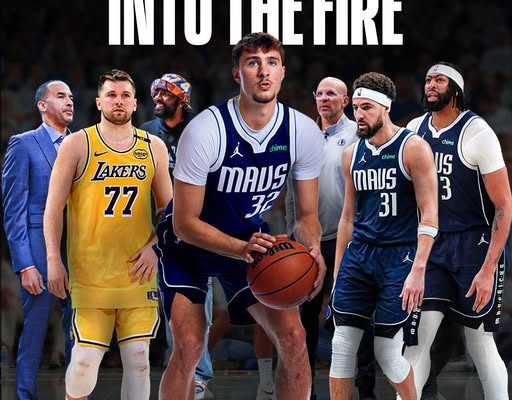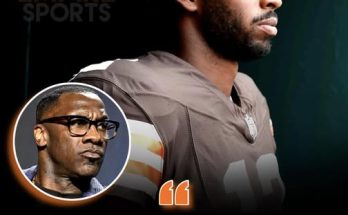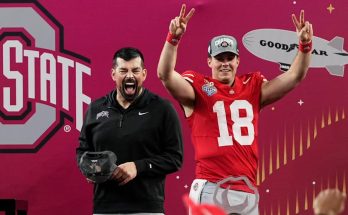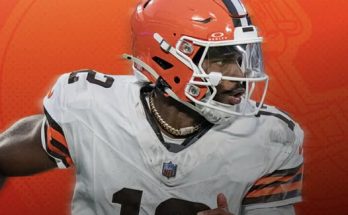Cooper Flagg is walking into a spotlight that few players in basketball history have ever experienced. Being the No. 1 pick in the NBA Draft is a monumental achievement in itself, but the circumstances surrounding his arrival to the Dallas Mavericks make the weight on his shoulders even heavier. It’s not simply about living up to his own hype as a generational talent; it’s about stepping into a franchise that has just undergone one of the most seismic shifts in recent memory. The Mavericks trading away Luka Dončić, the face of the franchise and one of the most dynamic players in the league, instantly shifted the narrative around Flagg from exciting young prospect to the centerpiece of an entire organization’s future. Expectations are sky-high, and the margin for error is razor thin.
Flagg has always been regarded as more than just another top prospect. Even in high school and AAU circuits, scouts and analysts raved about his rare blend of size, skill, and basketball IQ. At 6-foot-9 with the ability to handle the ball, create plays, and guard multiple positions, he was never going to be a player teams just slotted into a single role. His game screamed versatility, and comparisons to some of the league’s most versatile stars naturally followed him. Now, the Mavericks are betting their future that his ceiling isn’t just an All-Star, but a franchise-altering force who can carry the torch that Luka left behind.
The timing of his arrival is as intriguing as it is daunting. Dallas didn’t just lose a superstar; they traded one in his prime. Luka’s departure left a hole in the organization that feels more like a crater, and fans have been left reeling. For Flagg, that means the grace period many rookies get simply doesn’t exist. The Mavericks’ fan base isn’t in the mood for slow development or growing pains—they want hope, and they want results. Reports that Jason Kidd intends to give Flagg serious minutes right away confirm that the Mavericks aren’t easing him in. Instead, he will be asked to step onto the court from day one and not only contribute, but lead. That dual guard/forward role Kidd has in mind is more than a strategic move; it’s a declaration that Flagg is being trusted as the hub of this team’s offense.
Playing point-forward is no small task for any rookie, let alone one walking into this kind of environment. It requires more than just skill—it requires poise, decision-making, and the ability to see the game several moves ahead. Kidd, himself a Hall of Fame point guard, is putting a massive responsibility on Flagg’s shoulders by tasking him with orchestrating the offense. It’s not just about scoring; it’s about making the right reads, finding teammates, and controlling the tempo. That’s a role typically reserved for seasoned veterans who understand the grind of the NBA, but Kidd clearly believes Flagg’s basketball IQ and natural instincts set him apart. If anyone can thrive in that role early, it’s him. Still, the challenge cannot be overstated.
What makes this situation even more unique is the emotional dynamic surrounding the Mavericks. Players, fans, and media alike are still processing Luka’s exit. For many, he was more than just a player; he was the identity of the team. That means Flagg isn’t just being judged on his own merit—he’s being judged against the ghost of Luka, a nearly impossible standard. Every pass, every shot, every mistake will be dissected through that lens. If he excels, he’ll be heralded as the savior who helped Dallas turn the page. If he struggles, criticism will be swift and unforgiving. The weight of expectation can crush even the most talented players, and navigating that psychological burden may be one of the biggest challenges Flagg faces in his rookie season.
Yet, if there is any player who seems wired to handle such pressure, it might be Cooper Flagg. His competitive edge has been well-documented, and his calm demeanor under pressure is part of what made him such a coveted prospect in the first place. Even at the amateur level, he had a knack for rising to the moment, for hitting the big shot or making the key defensive stop when it mattered most. That kind of mentality is what gives the Mavericks hope that he won’t just survive under the spotlight, but thrive in it. His versatility is going to be his greatest weapon, because unlike most rookies who enter the league with glaring weaknesses, Flagg has the ability to impact the game in so many ways. If his shot isn’t falling, he can facilitate. If the offense isn’t flowing, he can shift his focus to defense and rebounding. That adaptability could be the difference between sinking and swimming in his first year.
There’s also something poetic about Jason Kidd being the one to mentor him through this process. Kidd knows better than almost anyone what it’s like to carry a franchise’s hopes from day one. When he entered the league, he too was hailed as a transformative player with the ability to change the game. He understands the pressures that come with being thrust into the spotlight, and he can serve as both a coach and a guiding voice for Flagg as he navigates the challenges ahead. Kidd’s vision for him as a point-forward speaks to both trust and ambition. He’s not looking to use Flagg as just another piece—he wants him to be the fulcrum of the Mavericks’ entire system. That’s not only a tactical decision, but a symbolic one, declaring to the league and to the fan base that this is Cooper Flagg’s team now.
But with opportunity comes risk. The NBA is unforgiving, and history is filled with highly-touted prospects who were thrust into big roles too early and never quite recovered. The question for Flagg isn’t whether he has the talent—it’s whether the Mavericks can surround him with the right infrastructure to allow that talent to flourish. Relying too heavily on him, especially as a teenager still adjusting to the physicality and speed of the NBA, could backfire if not managed carefully. Dallas needs to strike a balance between giving him the keys and ensuring he has support. Veterans who can shoulder some of the leadership burden, shooters who can create space, and defensive anchors who can ease his load will all be critical in making sure Flagg doesn’t burn out under the weight of expectation.
There is also the broader league context to consider. The Western Conference is stacked with elite teams and superstar talent, and Flagg isn’t stepping into a rebuilding situation where losses are excused. The Mavericks may not be immediate contenders without Luka, but the expectation in Dallas will always be to compete. That means Flagg will be measured not just against his draft class, but against the very best in the league. When he lines up across from LeBron James, Kevin Durant, Jayson Tatum, or Anthony Edwards, the comparisons will inevitably be made. Fans and media won’t want to hear excuses about youth or inexperience—they’ll want to know if he belongs. For Flagg, that’s both the challenge and the opportunity. Proving himself against the league’s elite will be the quickest way to cement his status as the new face of the Mavericks.
What makes this story so captivating is that it isn’t just about basketball—it’s about legacy. Luka Dončić left Dallas with unfinished business, and that void has created a hunger within the organization. Flagg isn’t just being asked to play; he’s being asked to inspire. He’s being asked to bring hope to a franchise that just lost its brightest star. That’s the kind of weight that can define a career, for better or worse. And while the challenges are immense, the upside is equally staggering. If Flagg lives up to the expectations, if he can carry Dallas back to relevance and one day even contend for championships, his legacy won’t just be as a great player—it will be as the player who saved a franchise from despair.
The reality is that this season, and perhaps the next several, will be filled with ups and downs. There will be nights where Flagg looks every bit the generational talent scouts promised, and there will be nights where the pressure and the competition remind everyone that he is still just a rookie. How he responds to those setbacks will be critical. His ability to stay focused, to learn, and to grow in real time will determine not just his trajectory, but the Mavericks’ future as well. For Dallas, the gamble has already been made. Luka is gone, and there is no going back. All their chips are on Cooper Flagg.
In many ways, that’s what makes this story so compelling. It’s not just about a player entering the NBA—it’s about a player entering the NBA at the exact moment a franchise needed him most. The intersection of timing, talent, and circumstance has created a perfect storm of expectation. Cooper Flagg isn’t just another rookie. He’s the No. 1 pick stepping into the void left by a superstar, tasked with becoming both the present and the future of a storied franchise. That is a spotlight brighter than most could ever imagine, and while it brings enormous pressure, it also brings enormous possibility. If Flagg can rise to the moment, he won’t just be remembered as the player who followed Luka—he’ll be remembered as the player who defined the next era of Dallas Mavericks basketball.



